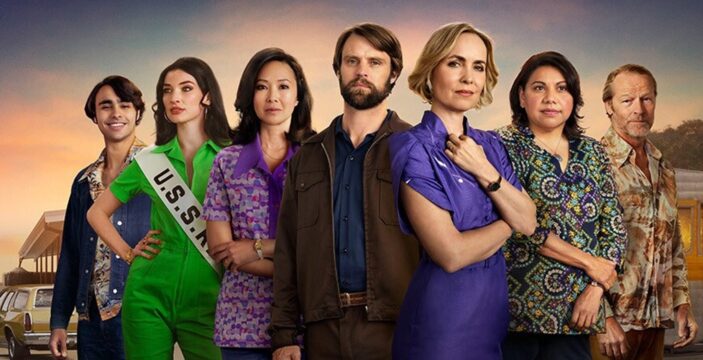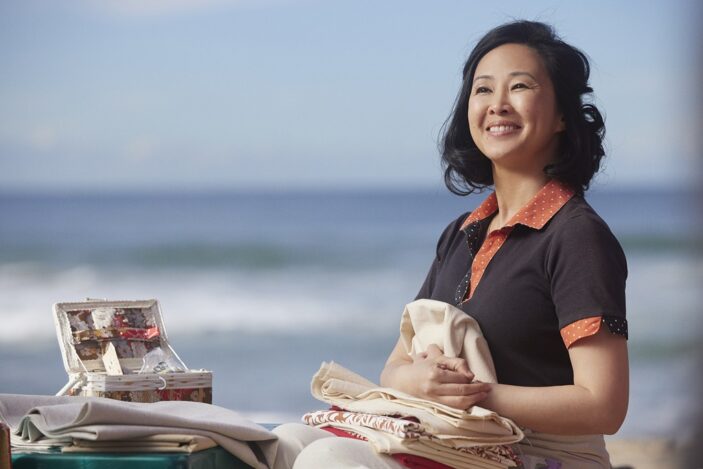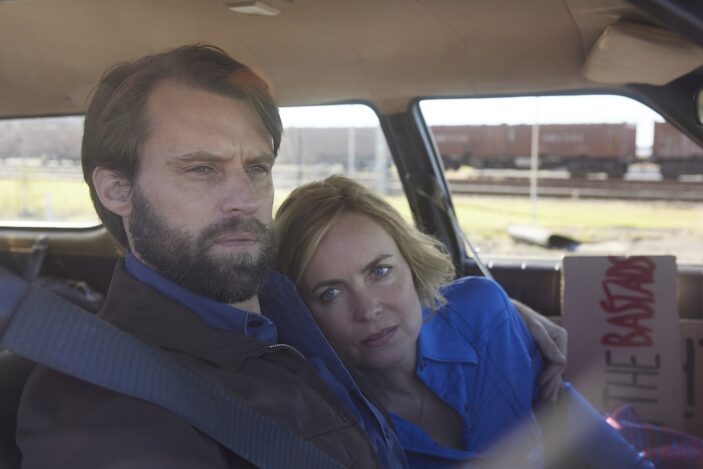
1979. It’s the end of an era, and everything is about to change. A global beauty pageant is converging on a small town, and for three families, the drama unfolding on the world stage is nothing compared to what they’re going through. Tony and Judy are married and sit on opposite sides of an ugly power strike. Their youngest daughter Mia is going off the rails, while their eldest, Tilly, has her head in the stars. The Bui family grapple with the fate of their son, whose life hangs in the balance. For the Wilber forces, the threat of prejudice proves the flashpoint for monumental change. And Tony’s brother Mick forges an alliance with the USSR pageant contestant, not to mention her KGB minder. The stage is set for a moment in history which will push these families past their limits. Welcome to the Last Days of the Space Age.
As the series arrives to stream on Disney+ in Australia, Peter Gray spoke with three of the ensemble cast – Radha Mitchell, Jesse Spencer and Linh Dan Pham – about how they immersed themselves in the story’s 1970s setting, how they feel the story resonates today, and how they are finding international audiences reacting to an Australian slice of history.
Because the series highlights a point of history and culture in Australia, how did each of you immerse yourself in the 1970s setting? Was there anything you learned about the era that surprised you?
Jesse Spencer: Gosh, I think we all came from completely different places. All the characters in the show are coming from different places at the beginning, and for my character I immersed myself into the family man, a union leader fighting for workers’ rights, and then the tension within our family, with his wife who’s crossed the picket lines (and) working for the company they’re fighting, and teenage daughters who have their own dreams and aspirations, and are sometimes playing up. I think everyone was different, which makes it such a great piece.
Radha Mitchell: We all came out of the 70s. I think Jesse came out of 1979…he just made it in. But returning felt like it was. I had been very nostalgic about Australia in the 1970s having lived in Los Angeles for a long time, and just the pace of that time and the kind of relaxed vibe and sanity of that time in contrast to the insanity of the things that were happening at that time. It felt very familiar and I felt like we kind of captured that. What helped was the costumes and that gaudy fashion, and all the details that were in the sets that really gave us a sense of place.
And for you Linh Dan, first of all I want to say how great you were in Blue Bayou.
Linh Dan Pham: Oh, thank you.
How did you find your way into the 1970s setting? Was there a personal connection for you?
Linh Dan Pham: Well, the set and the costumes really helped to get into the era, but in terms of the character, of what Sandy is going through, it allowed me to open a conversation with some of my relatives. They got out of Vietnam at that time, so it was quite personal to me and quite moving, because it was something they never talked about before. This trauma that they had kept for themselves. This was a good door to get into the character, so I reconnected with my family through this show. It was quite personal.

It’s always so nice when a film or television project can open up those kind of conversations. I wanted to say to you Radha, the “You’re a shit shot” line is one that has stayed with me,
Radha Mitchell: (Laughs) I’ll have to tell David Chidlow, the writer. You can imagine me in front of the mirror practicing that, “You’re a shit shot!” (laughs).
With your character of Judy, there’s an interesting dynamic with her and Tony. Professionally they’re at odds with one another. Was that part of the appeal for both you and Jesse in exploring that relationship? Especially as something that still resonates today?
Radha Mitchell: You think about historical kind of characters, or times in the past that there was some sort of difference in the people. I think all along we’ve seen costumes change, but it’s been the same sort of issues, or the same internal issues. I think a lot of the time, if you’re talking about that sort of gender parity or changing on the home front, I guess that is an issue that plays out in different ways in families today. That freedom for women to be in the workforce was certainly, you know, a conversation you can imagine Cleo magazine having back in the 70s.
How we’ve got to where we came from is really interesting to reflect. And even just listening to (Linh Dan) speaking about how the story opened up personal things from the past, it’s interesting to look backwards to how we got to where we are. For me, I was looking a lot at my grandmother and her kind of journey into politics. I guess, in the late 70s, early 80s, what she had to confront, in terms of the opposition from men and how she kind of charmed her way through things was interesting. She even gave me a book called “The Women’s Power Handbook”, which I’d never read until we started shooting this show. I was like, “Oh wow, that’s the perfect book!” Judy’s so hesitant about every step she’s taking, but I think in the end she finds her stride.
With the career counsellor at the beginning of the series talking about where these children should go with their career, I was wondering, with all the nostalgia and future optimism whirling around this story, was there any sense of reflection for the three of you looking back and thinking of the path you are one. Did your career counsellor inform you about being actors?
Radha Mitchell: My agent said “Don’t do it!” (laughs). I was advised not to do it.
Jesse Spencer: That’s not bad advice, though. Sometimes when someone tells you “Don’t do it”, you do it anyway. You have to do it. It’s almost a test. So, it’s not a bad thing to tell someone not to do something. It’s a good dynamic we have in this show, playing with those traditional roles, We have a family man and a homemaker and children who have dreams and aspirations. It’s how do you keep all those balls in the air as things change? As they inevitably do. And that’s the attraction of this show. With all the different characters all going through the ebb and flow of challenges and transforming through those.
Radha Mitchell: And doing that together, I guess, in relationship to each other. There’s different ways to talk about it, but yeah for our characters it was difficult to both grow at the same time.

You’ve all been involved in international productions, but is there any type of conscious effort when it comes to Australian productions? And Linh Dam, how did this come about for you? Is there a purposeful thought of wanting to return home at some point with your work?
Linh Dan Pham: I don’t have a strategy for my career. It’s very instinctive. I read something and I like it, or if I’m scared I’m thinking “If you’re scared, you should do it!” I got into this project through my American agent. And they were actually scared. They thought I wasn’t going to do it, because I had to go to Australia for four months. I loved it! I thought “Oh, it’s going to be summer,” and I get here and it’s winter. But it’s all about instinct. The script was so amazing. This female character is so powerful. The drive that Sandy has, even though she’s quite, she’s determined. She has faith.
Jesse Spencer: Yeah, I’ve been looking for years to try and do something. It’s hard. I was in network TV, so it’s difficult to actually just schedule something at the right time to come back. But I think, like Linh Dam, I feel quite instinctual about when I read something. When I read this I felt that, yeah there was a lot of nostalgia. It felt very familiar. But there were great themes running through it with these characters, and there’s lots to play with. That’s what you look for.
Radha Mitchell: And we have a great industry here. I feel like there’s very interesting stories that are being told in Australia, and it’s great to speak with the Australian voice. Things can be more specific, more emotional coming from here. Things that are made often in the US have this very broad perspective of who they want to communicate to, and in the end, there’s no story left. I feel like a lot of the stories that come out of Australia are driven by directors or there’s a real sense of intimacy about them.
I’m finding that Australian productions very much have thrived in the last few years. And now we’re seeing things like Fisk and Kath & Kim find an audience overseas…
Radha Mitchell: We have a secret agenda. We’re trying to turn the world “Australian, mate.”
I think it’s awesome that Australian stories are resonating with American audiences, specifically, because for so long there was always that gap of will they get our humor? And our our accents are so otherworldly to them. Do you know of people that have seen this show in America and how they’ve reacted to it?
Radha Mitchell: The only person that I know that’s seen it in America is Jesse (laughs).
Jesse Spencer: More and more people are very much aware of Australian culture. There’s much more familiarity. People pick my accent pretty well. They used to think I was from London, but now they very definitely know I’m Australian. I think there’s a lot more familiarity than there used to be, and there’s a lot of interest in this country. So a show like this, it has universal themes that everybody can relate to. It’s a little quirky and a bit weird, which maybe a little exotic, but it’s a different time and different place, and hopefully it resonates.
And just quickly before I go, I love that “Xanadu” gets a shout out here. I mean, it happens in a horrible scene, but Radha, your character talks of how the song is now ruined for her. I was wondering is there a song for the three of you that you just can’t deal with anymore?
Jesse Spencer: (Singing “Total Eclipse of the Heart”) “Turn around…”
Radha Mitchell: Can I put a more positive spin? I really love the song “Staying Alive” by The Bee Gees. I don’t know if that was actually 1979, but it was around then. That’s a song I can just never hear enough of.
All episodes of The Last Days of the Space Age are now streaming on Disney+ in Australia and on Hulu in the United States.
